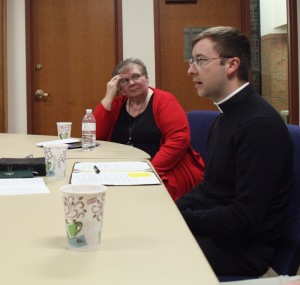By Anne Marie Amacher
The Catholic Messenger
DAVENPORT — The final holy hour for life evening sponsored by Our Lady of Victory Parish dealt with medical treatment for the terminally ill. What does the Church say?
The Nov.13 event began with exposition of the blessed sacrament, prayer and benediction led by Father Thom Hennen, vocations director for the Diocese of Davenport.
 During the holy hour, Fr. Hennen said he chose the Gospel reading from Luke of Mary and Joseph going to the temple to present their son to God. “You see the whole spectrum of life,” Fr. Hennen said. You see the child Jesus; his mother Mary, who was probably in her teens; Joseph, who was somewhat older, and there were Simeon and Anna in advanced years.
During the holy hour, Fr. Hennen said he chose the Gospel reading from Luke of Mary and Joseph going to the temple to present their son to God. “You see the whole spectrum of life,” Fr. Hennen said. You see the child Jesus; his mother Mary, who was probably in her teens; Joseph, who was somewhat older, and there were Simeon and Anna in advanced years.
To some, Fr. Hennen said, it was easy to write off Simeon and Anna. “It’s easy to say they don’t matter. But they do have a purpose. Everyone has a purpose.”
Fr. Hennen said he has a smart phone. He can send email, texts, take photos, look up things, listen to music, calculate and pay bills and use the phone as a boarding pass. And in a pinch, he has a flashlight. “Oh, I can even make and receive phone calls,” he said to the group, which laughed. The phone is useful in that he can do so many things with it.
But what about the beauty, dignity and gift of life? Advanced age does not make people useless. “We are called to treat people as people. Sometimes their usefulness is hidden from us. But there is dignity there to recognize and protect.”
Following the holy hour, a discussion was held on end-of-life decisions. Fr. Hennen noted that because culture tends to value people based on their usefulness some people nearing the end of life may question their own value. “It’s a time to rediscover life apart from usefulness.”
He pointed out that when he was studying in Rome he watched then-Pope John Paul II struggle at the end of his life. “You could see it in his face as he tried to say words.”
When first elected, Pope John Paul II was a vibrant, active man. He talked about dignity of the body, marriage and family. He laid the groundwork for Theology of the Body. As an older man he was still teaching about dignity. “His purpose was to drive this point home that the dying, ill and old have dignity.”
When it comes time to make end-of-life decisions, Fr. Hennen said if there is a reasonable chance for an individual to live longer and more comfortably, “by all means try different means.” But you aren’t obligated to try everything that is out there.
Regarding hydration and nutrition, “it’s a big decision.” If the organs are shutting down, the person should be made comfortable. “You do not want someone to die of starvation or dehydration.”
Fr. Hennen said at the end of life it is important to make the person comfortable and not be in pain.
People should consider an advanced directive/living will or power of attorney. “If you have to choose, consider the power of attorney.”
He said living wills can be a matter of interpretation by family or medical personnel. With a power of attorney, that designated individual and alternate know your wishes.
“Clearly express what you would want done or not done,” he said.
One person asked whether the Church allows sick individuals to refuse chemotherapy or dialysis. Fr. Hennen said that is a difficult question to answer. If such treatments would be of benefit, then continue with treatments. But if they are not benefiting or there is a cost burden, then “by all means stop.”
Another participant said she wished more information would be given at the hospital concerning options and their consequences. “Doctors want to save their patients,” Fr. Hennen said. But he agreed that an informed decision is important. “Not everything is crystal clear,” Fr. Hennen said.
He encouraged his audience to read the U.S. bishops’ pamphlet on “Ethical and Religious Directives for Catholic Health Care Services.”








